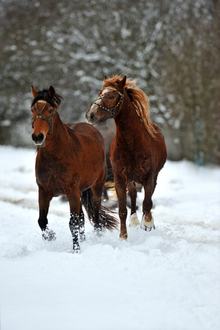Although your horse may have grown a fine, warm wooly coat leading into the cold winter months, it is important to make sure your horse receives the feed and water necessary to remain healthy during cold weather.

Keeping horses healthy in cold weather
Cold winter weather makes special demands on your horses' health so it is important to make sure your horse receives the feed and water necessary to remain healthy during cold weather.
Typically, a 1,000-pound mature horse should consume 15 to 17.5 pounds of hay daily to meet critical temperature needs during cold weather.
During prolonged periods of cold temperature -- several days below the critical temperature -- both the concentrate and forage portion of the diets should be increased in equal proportions. The energy density of the concentrate mix can be increased by adding fat in the form of 4 to 8 ounces of a vegetable oil per day, or by the addition of a commercial fat supplement according to label recommendations.
Feeding of additional amounts of concentrate or increasing the energy density of the concentrate is especially important if the horse is in poor body condition with low body fat, or is a âÂÂhard keeper.â The extra body fat provides an additional insulating effect against wind and also serves as an energy reserve that can be used when the horse is fed an energy-deficient diet.
The Importance of Water
Maintaining ample water intake is the most critical part of ensuring the health of your horse during cold weather. The horse prefers a water temperature of 45 to 65 degrees F. Under normal conditions, the horse will consume 1 gallon of water per 100 pounds of body weight.
A 1,100-pound horse will consume 10 to 12 gallons of water daily. As the water temperature decreases, the horse will consume less water. The same 1,100-pound horse may consume as little as 1 to 3 gallons of water daily when water temperature is 32 degrees F.
Low water intake is directly related to the increased incidence of impaction colic. Water intake can be encouraged by increasing the amount of forage being fed prior to a drop in temperature. The resulting increase of dry matter encourages the horse to drink more water.
Concentrate mashes should be fed during the actual cold period when water temperature is below 45 degrees F. Feeding 2 to 3 gallons of hot water daily mixed into a mash with a textured or pelleted concentrate mix will provide additional water intake.
To avoid gas colic, allow the mash to sit for 15 minutes; this will permit the feed to expand prior to feeding. If possible, offer 10 gallons of water, at 65 degrees F or warmer, twice daily. Break and remove ice from water tubs, making certain to provide water that is available free-choice.
My Horse University Extension at Michigan State University advises horse owners to follow these tips to maintain horse health in winter weather:
- Monitor horses carefully for shivering when they are turned out in cold, windy and/or wet weather, whether blanketed or not.
- Maximize indoor ventilation by keeping doors and windows open or using ceiling fans and vents.
- If blanketing, choose blankets that are water repellent, moisture wicking, and well-fitting.
- Consider booster vaccinations for diseases such as influenza, rhinopneumonitis, and strangles.
- Assess body condition score regularly.
- Provide adequate calories. A horse's energy requirements may increase up to 25%.
- Give unlimited access to unfrozen water.
